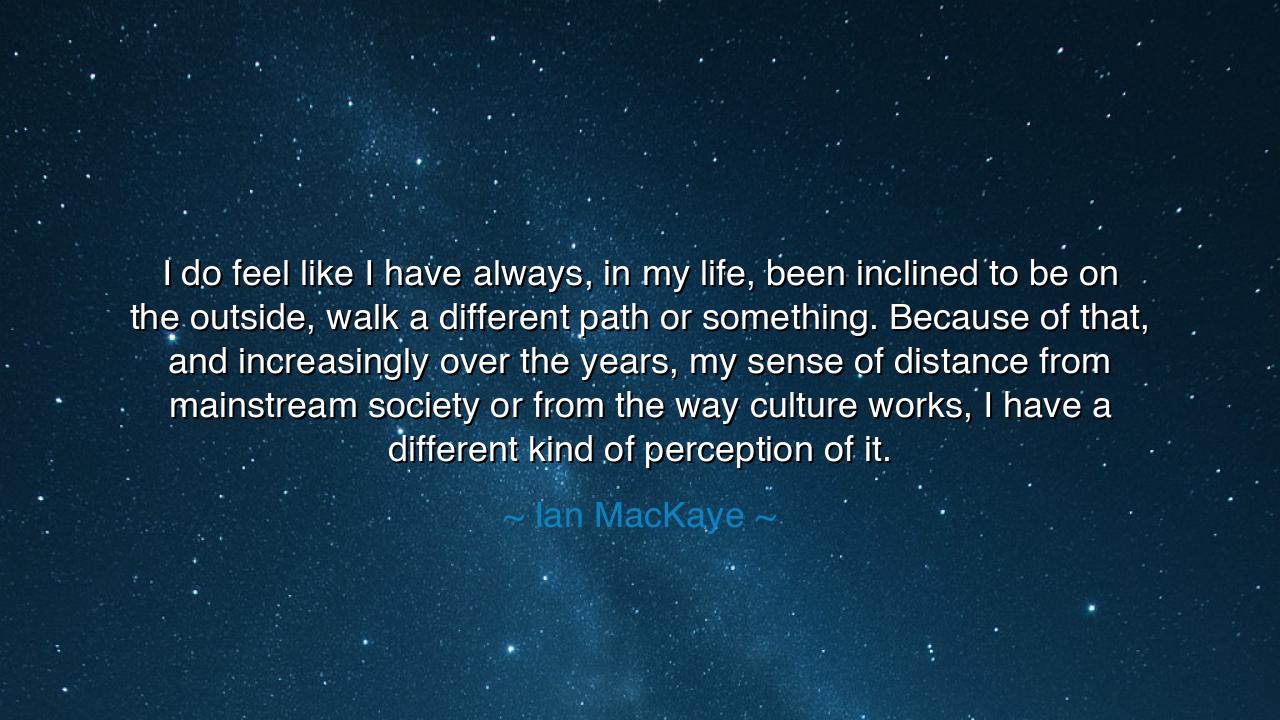
I do feel like I have always, in my life, been inclined to be on
I do feel like I have always, in my life, been inclined to be on the outside, walk a different path or something. Because of that, and increasingly over the years, my sense of distance from mainstream society or from the way culture works, I have a different kind of perception of it.






Hear the words of Ian MacKaye, artist, rebel, and seeker of authenticity: “I do feel like I have always, in my life, been inclined to be on the outside, walk a different path or something. Because of that, and increasingly over the years, my sense of distance from mainstream society or from the way culture works, I have a different kind of perception of it.” These words are a confession and a triumph: the confession of one who has felt apart, who has chosen the road less traveled; the triumph of one who discovered that in standing at a distance, he gained a vision others could not see. To be outside the center is not to be without value, but to see the center more clearly.
The origin of this thought springs from MacKaye’s life in music and counterculture. As a founder of bands like Minor Threat and Fugazi, and as a pioneer of the punk and hardcore movements, he was no stranger to being apart from mainstream society. He embraced independence, rejecting the commercial trappings of the music industry, insisting on honesty over profit. From this place of deliberate separation, he gained what he calls a “different kind of perception”—the gift of seeing culture not as one trapped within it, but as one who views it from the outside.
The ancients also praised the wisdom of the outsider. Consider Diogenes the Cynic, who lived in a barrel and mocked the false values of Athens. To many he seemed mad, but his distance from wealth, convention, and politics gave him clarity. When Alexander the Great came to meet him, offering to grant him any favor, Diogenes replied only: “Stand out of my sunlight.” This was not madness but vision—the understanding that true power lies not in bowing to culture’s expectations but in walking one’s own path. MacKaye’s words echo this ancient spirit of defiance.
History, too, tells of those who chose the different path and changed the world. Consider Galileo Galilei, who dared to look at the heavens and claim the earth was not the center. To mainstream society of his day, he was a heretic, cast to the outside. Yet it was precisely because of his distance from accepted belief that he saw truth. His perception was sharpened by his willingness to be apart. And though he suffered, the world eventually caught up to his vision.
The meaning of MacKaye’s words is clear: there is power in refusing to conform. To walk the path of the outsider is often lonely, yet it grants sight that the crowd cannot possess. Those immersed in mainstream culture are swept along by its tides, rarely questioning where they are carried. But the one who steps aside, who pauses, who questions, sees both the flow and the shore. He gains the strength to choose—not blindly to drift, but consciously to move with purpose.
What lesson, then, shall we carry from this? That we must not fear distance from the crowd. If your path leads away from the throngs, do not despise it. Walk it with courage, for solitude often births vision. At the same time, let your distance not harden into bitterness, but into clarity. From outside, speak truth to those within; use your unique perception not to scorn, but to illuminate. For every society needs its outsiders, its prophets, its dissenters, lest it collapse under the weight of its own unquestioned assumptions.
Therefore, children of the future, engrave this wisdom upon your hearts: the outsider’s path is not weakness, but strength. Do not cling to the approval of the multitude if it blinds you to truth. Dare to step aside, dare to question, dare to see differently. For the world is moved not only by those who march with the crowd, but by those who stand apart, pointing to a better way. And in this, the life of Ian MacKaye teaches us that from distance may come vision, and from vision, the possibility of transformation.






AAdministratorAdministrator
Welcome, honored guests. Please leave a comment, we will respond soon